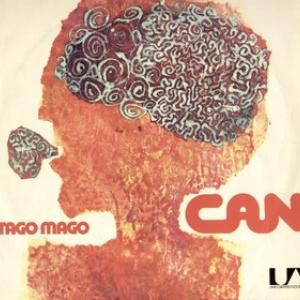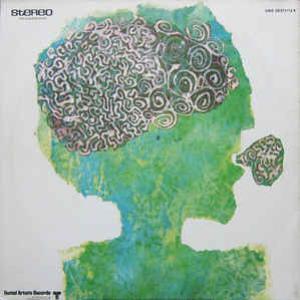Tago Mago
by Can


Artist:
Can
Label:
United Artists Records
Catalog#:
UAS 29 211/12 X
Format:
Vinyl
Country:
Germany
Released:
1971
| Tracklist | |||
| A1 | Paperhouse | 7:29 | |
| A2 | Mushroom | 4:08 | |
| A3 | Oh Yeah | 7:22 | |
| B | Halleluwah | 18:22 | |
| C | Aumgn | 17:22 | |
| D1 | Peking O. | 11:35 | |
| D2 | Bring Me Coffee Or Tea | 6:47 | |
Credits
Bass - Holger Czukay
Design [Cover Design] - Ulrich Eichberger
Drums - Jaki Liebezeit
Guitar - Michael Karoli
Organ, Electric Piano - Irmin Schmidt
Producer, Composed By, Arranged By - Can
Vocals - Damo Suzuki
Notes
Recorded at Inner Space Studios
Produced for Prom
Published by Prom
Strawberry Bricks Entry:
Following Malcom Mooney’s departure, Can enlisted Kenji “Damo” Suzuki, reportedly on the spot, while he was busking outside a cafe in Munich; that night, he played his first gig with the band. Intact, the band issued Soundtracks, a compilation of-you guessed it-music used in films. The band’s next studio album, Tago Mago, (named after Isla de Tagomago, an island off the east coast of Ibiza, Spain) was recorded by Holger Czukay at Schloss Nörvenich, where the band were living at the time. A sprawling double-album, the first record contains (more or less) songs, including “Paperhouse” and the trippy “Mushroom.” Suzuki’s vocals are mostly improvisatory, a flowing stream of words that fits perfectly with the band’s music. “Oh Yeah” bounces over Jaki Liebezeit’s deft drumming; but the meat of the album consists of long improvisations that illustrate what Can does best: using less to create more. “Halleluwah” begins with a funky riff and rides the groove across the album’s second side. Michael Karoli adds some violin, but it’s all about the sexy and infectious rhythm of Liebezeit and Czukay. “Aumgn” takes free rock to a whole new level; it sounds like a nightmare, but in a good way. Eventually Czukay’s engineering would eclipse his bass playing with the band, and it starts here. The fourth side closes with the quirky “Peking O.” and the more eastern-tinged “Bring Me Coffee or Tea.” In late 1971, the band would play their first concerts in the UK and release a single, “Spoon” b/w “Shikako Maru Ten” which topped the West German charts. Suzuki would record a few more albums with Can, including the magnificent Ege Bamyasi in 1972 and Future Days in 1973, and then leave the band to become a Jehovah’s Witness.

